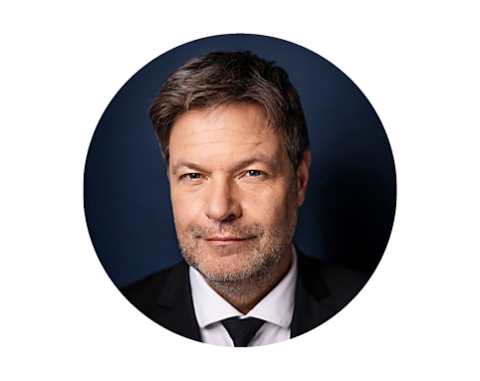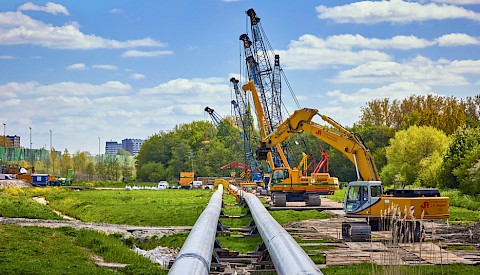Safeguarding Germany’s and Europe’s energy supplies
A reliable supply of energy is one of the essential prerequisites for economic growth, employment and prosperity. From energy extraction, efficient distribution and utilisation through to safe storage, HFI-welded steel pipes from Mannesmann Line Pipe make a vital contribution to supply security.
With the escalation of the war in Ukraine in February 2022, global awareness of the importance of supply security and critical infrastructure was abruptly raised.
The sanctions imposed by the EU on Russia led to a ban on imports of Russian oil, gas and coal in the course of 2022. The price of wholesale gas soared, suddenly making gas about four times as expensive as before. Just how dramatic the effects of this were is illustrated by the example of the Uniper energy group, which was contractually bound to supply its 1,000 or so major customers and teetered on the brink of insolvency. Under its rescue package, the German government acquired 99 per cent ownership of Uniper as part of an EUR 8 billion capital increase at the end of 2022.
The cost of oil and electricity rose alongside gas. Private households and the economy are still feeling the effects.
Short-term safeguards
To compensate for the supply shortfalls from Russia, more gas was firstly imported from EU countries. In addition, under the LNG Acceleration Act passed by the German government, work on building gas pipelines and infrastructure for liquefied natural gas terminals was already underway by summer 2022.
The role played by HFI-welded steel pipes from Mannesmann Line Pipe in this should not be underestimated. "We were fortunately able to fulfil the extremely short-notice requests for the LNG terminals in Wilhelmshaven and Brunsbüttel," says Head of Sales Konrad Thannbichler. "Of course, our supplies for the construction of this vital infrastructure to ensure security of supply in Germany and Europe had top priority for us."
It was therefore possible to commission the Floating Storage and Regasification Unit (FSRU) in Wilhelmshaven at record speed at the beginning of 2023. Federal Minister for Economic Affairs and Climate Protection Robert Habeck was highly satisfied: "The example of Wilhelmshaven shows that Germany can be quick off the mark and move infrastructure projects forward with great determination when federal and state governments and project stakeholders pull together." Commissioning in Brunsbüttel followed only a short time later. Two more LNG terminals, Stade and Wilhelmshaven II, are currently under construction.
The example of Wilhelmshaven shows that Germany can be quick off the mark and move infrastructure projects forward with great determination when the federal and state governments and project stakeholders pull together.«Dr. Robert Habeck, Federal Minister for Economic Affairs and Climate Protection

Photo: © BMWK /Dominik Butzmann

District heating networks are also being expanded in the Netherlands. Mannesmann Line Pipe has supplied 600 tonnes of HFI-welded steel pipes to the WarmtelinQ project.
Photo: © WarmtelinQ, Vincent Basler
Gas storage capacity as an indicator of supply security
The total capacity of German gas storage facilities is just under 25 billion cubic meters of gas, which is equivalent to around 28 per cent of Germany's annual consumption. Gas stored in Germany accounts for around 25 per cent of the European Union's gas storage capacity, which impressively underlines its importance for security of supply at European level.
The Bundesnetzagentur, the federal authority responsible for electricity, gas, telecommunications and postal infrastructures, is charged with continuously monitoring the filling levels. The achievement of the required filling levels on 1 October and 1 November ensured confidence in the security of supply in Germany in the winter of 2022/23.
Short-term supply security vs. medium-term energy transition
Because of the need to safeguard supplies, the energy transition necessitated by climate change and the associated transformation process for generation, distribution and storage shifted out of the public eye. Yet the issue also underlines the need to become less dependent on energy supplies from geopolitical unstable regions in the medium and long term. The possible solutions here also include the use of alternative and environmentally friendly energy sources, such as green hydrogen and ammonia. Gas and oil for heating can be easily substituted by heat pumps, solar thermal energy, and local and district heating, for example.
HFI-welded steel pipes – in demand across the board
Mannesmann Line Pipe has products and solutions that meet the highest international safety standards, both in the field of energy exploration and for the construction of the necessary infrastructure for energy distribution and storage. Thannbichler: "Our broad range of HFI-welded steel pipes means that we have high-quality, sustainable and cost-effective products for all areas of the energy industry." In addition to applications for oil and gas, this also includes LNG, hydrogen and ammonia, as well as steel pipes for onshore and offshore wind turbines. "We have also been supplying system solutions for district heating for decades." The best examples of this are the WarmtelinQ and Warmtenetwerk Antwerpen Noord projects in the Netherlands and Belgium.
Expansion of district heating
According to the district heating trade association AGFW, around six million of the approximately 43 million homes in Germany are currently heated with district heating. The industry sees potential for increasing this figure to 18 to 20 million. The trick here is that various renewable sources and technologies, such as large heat pumps, geothermal energy, solar thermal energy, biomass and waste heat from industry or data centers, can be integrated into district heating infrastructures.
According to AGFW's forecasts, this could enable heating networks to become climate-neutral by 2045. This would simultaneously reduce dependence on politically unstable regions and significantly improve security of supply and user acceptance with regard to the decarbonisation of the heating sector.

The FSRU Höegh Esperanza is permanently moored to a jetty in the port of Wilhelmshaven, where it unloads the LNG from incoming LNG tankers moored to the FSRU's starboard side.
Photo: © NPorts, Andreas Burmann
Salzgitter AG banks on green hydrogen
In February 2022, Uniper and Salzgitter AG signed a cooperation agreement under which Uniper is to supply the SALCOS project in Salzgitter with competitively priced green hydrogen for the production of climate-friendly steel. The basis for this is the Green Wilhelmshaven project, in the context of which an ammonia import terminal and a 1 GW electrolysis plant for hydrogen production are to be built by the end of the decade. In combination with the import terminal, the electrolyser could supply around 300,000 tonnes of green hydrogen, says Uniper.
What currently sounds futuristic must soon become common practice if the ambitious targets for the decarbonisation of industry are to be achieved.
Urgently needed market ramp-up for green hydrogen
This is because the demand for green hydrogen and hydrogen derivatives such as ammonia, methanol and sustainable aviation fuels (e-SAF) is huge. The National Hydrogen Strategy estimates an annual hydrogen demand totalling 90 to 110 terawatt hours (TWh) by 2030. Germany will therefore be dependent on imports. HINT.CO based in Leipzig, the world's first hydrogen trader, has been founded to get the market up and running. The company, which is part of the non-profit H2Global Foundation, aims to boost supply and demand for green energy produced abroad. To this end, hydrogen derivatives are purchased in bidding processes at the lowest price under 10-year contracts, which are sold on the demand side through short-term contracts. This is intended to incentivise companies to invest in renewable energies. The Federal Ministry for Economic Affairs and Climate Protection (BMWK) is providing up to EUR 4.4 billion in securities for new rounds of bidding for contracts running until 2036.
Measures taking effect
All in all, the short-term measures and the medium and long-term alternatives in the choice of energy sources appear to be strengthening security of supply in Germany and Europe. "With our Mannesmann HFI-welded steel pipes, we are now doing and will continue to do everything we can," says Thannbichler summing up.

Our broad range of HFI-welded steel pipes means that we have high-quality, sustainable and cost-effective products for all areas of the energy industry.«Konrad Thannbichler, Mannesmann Line Pipe Head of Sales
Secure supplies

The constant availability of energy is indispensable for all participants in the global economy. Security of supply has far-reaching economic, environmental, social and geopolitical significance.
It all started with the 1973 oil crisis
The concept of energy security dates back to the first oil crisis in October 1973. This was when the Organisation of Arab Petroleum Exporting Countries (OAPEC) cut oil production by 5%, which led to a dramatic increase in oil prices and in some cases to severe recessions in Western industrialised countries. As a result, numerous countries built up or massively expanded their strategic oil reserves. The oil reserve in Germany is organised and monitored by the dedicated Erdölbevorratungsverband (EBV) and meets 90 days' demand.
Selling reserves to stabilise markets
Some of the reserves in Germany were sold during the Gulf War in 1991, after the Hurricane Katrina disaster in the USA (2005), due to Libya's breakdown as an oil exporting nation in 2011, and in 2018 when the Rhine level fell to a level where ships could no longer be fully loaded. Most recently, oil reserves totalling 60 million barrels were released following Russia's invasion of Ukraine.
Monitoring the gas supply
A quarter of primary energy supplies in Germany are covered by natural gas. Since 23 June 2022, we have been in the "alert stage" of the Gas Emergency Plan in Germany. This emergency plan defines three escalation levels – early warning, alert and emergency. The onset of the various levels depends on the degree of disruption, the anticipated economic and technical impact, and the urgency of resolving the disruption at the national level. The gas supply situation is monitored, analysed and evaluated by the Bundesnetzagentur, a federal authority within the remit of the Federal Ministry of Economic Affairs.
Regulating gas storage levels
The regulation of gas storage levels in Germany was adjusted several times in the course of 2022. This involved in particular the introduction of required filling levels to improve provision for the winter months. The filling levels must reach 85% by 1 October and 95% by 1 November. According to the Bundesnetzagentur, this was a key factor in preventing a gas shortage in the winter of 2022/2023.
Extra-high-voltage grid and power grid expansion
The Bundesnetzagentur is also responsible for planning and authorisation procedures in the German extra-high-voltage grid and for implementing planning approval procedures for national and cross-border power grid expansion projects.
